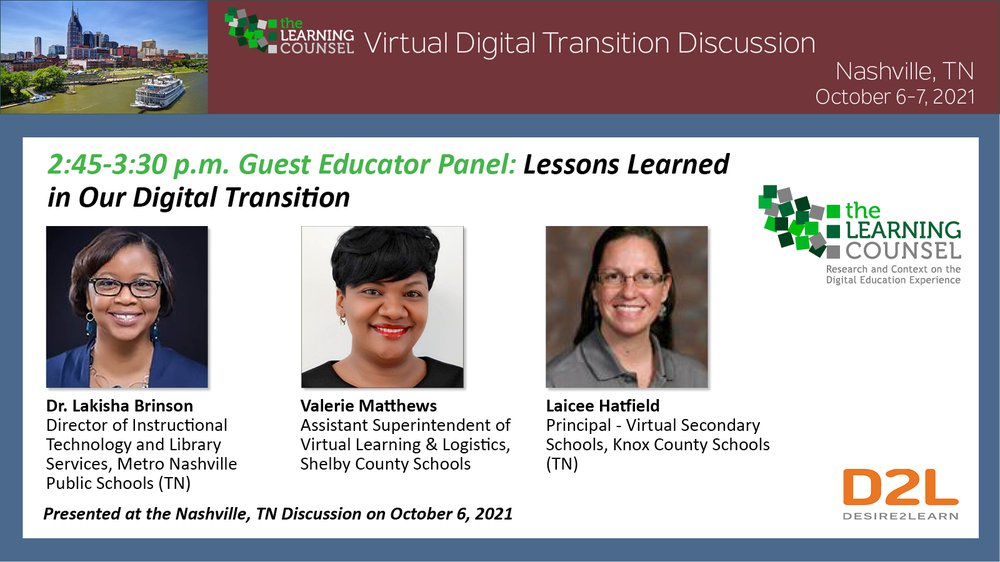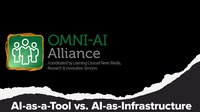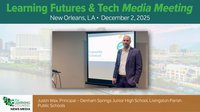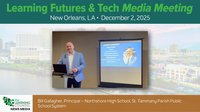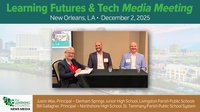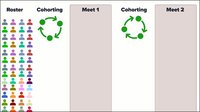It’s time for our Lessons Learned in Our Digital Transition discussion. This year’s Tennessee discussion features Dr. Lakisha Brinson, Director of Instructional Technology and Library Services at Metro Nashville Public Schools, Valerie Matthews, Assistant Superintendent of Virtual Learning and Logistics at Shelby County Schools and Laicee Hatfield, Principal of the Virtual Secondary Schools at Knox County Schools. As in past discussions, panelists tend to hold nothing back – they leave it all on the discussion room floor just for you.
According to Dr. Lakisha Brinson, “I honestly believe that we will see continuous exploration over the next few years, schools still trying to figure out the right fit and the “magic” mix. We'll see even more of a shift towards virtual learning and what that looks like. Even our little ones. I know historically, virtual school has usually been more high schools, but I do feel like parents are viewing it more as an option for their other students. I think it is just going to be a way of the future, but an integrated way, not seen as a set aside, like now. we have to call out blended learning when in essence it is just best, best practices with integration. In time, we'll see that it is just the norm, and the shift is going to be finding what works for every student in every school.
Laicee Hatfield, Principal of Virtual Secondary Schools, said “This is our very first year having our (virtual) school. We had one last year, but for it to be officially recognized at the state level, this is our first year. That being said, I've been here four weeks, so I'm learning just as much right now as our teachers are. The teachers are super excited to be on this journey. And a lot of our teachers that came in, they were rockstars in the classroom and they were looking for the next challenge and they wanted to be on the ground level of building this up. I definitely think the future, virtual learning, is here, but what I'm learning also is that the students aren't here just for COVID reasons.
“And a lot of the students that do need virtual learning have some form of trauma, and what that entails. So, we're really looking at ACEs training for our teachers and for our students. But our model here is also very unique and I love the models that you shared. We don't have an entire building to house all our teachers and where they can have their own space that’s soundproof, where they can teach. We have asynchronous and synchronous days. So, our teachers teach in their home setting. And then we have an asynchronous day where the grade levels come in, once a week. And we do pit team meetings. We discuss student successes, uh, who needs additional support, um, and making sure that students aren't falling through the cracks. I think what scares me the most is when you were in a physical school setting, students may go all day and not speak to anybody, right? And they can fall through the crack, but when you get into a virtual school that crack widens, and there's a, more of a chance for a student to go unnoticed. So, we really need to be very strategic and build those relationships and get to know our students. That's what we focus on in our asynchronous days.”
In these Tennessee districts, just like your own district, there are many lessons learned… so far. And you can bet your bottom dollar there are many more lessons to come. Tune into this wide-open guest educator panel, featuring three of Tennessee’s (and our nation’s) greatest education minds. From good times to bad, and back to good again, it’s been a whirlwind of educational activity. So, to the surface, catch your breath, and back at it again. Your students will thank you. And so will your staff.

